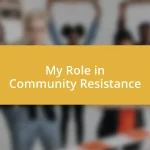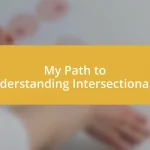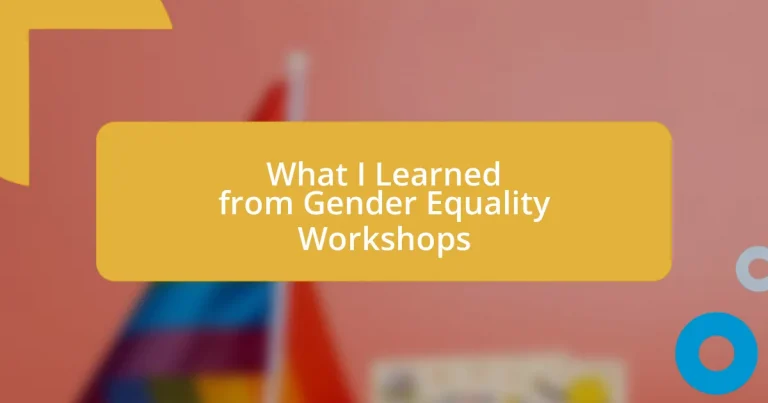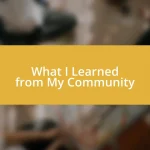Key takeaways:
- Gender equality workshops enhance personal growth through vulnerability, shared experiences, and diverse perspectives.
- Participants gain valuable tools for advocacy, including effective messaging strategies and social media engagement.
- Building supportive communities empowers individuals to collaborate, hold each other accountable, and create lasting change.
- Continuous education on gender issues fosters understanding and drives action against systemic inequalities and biases.
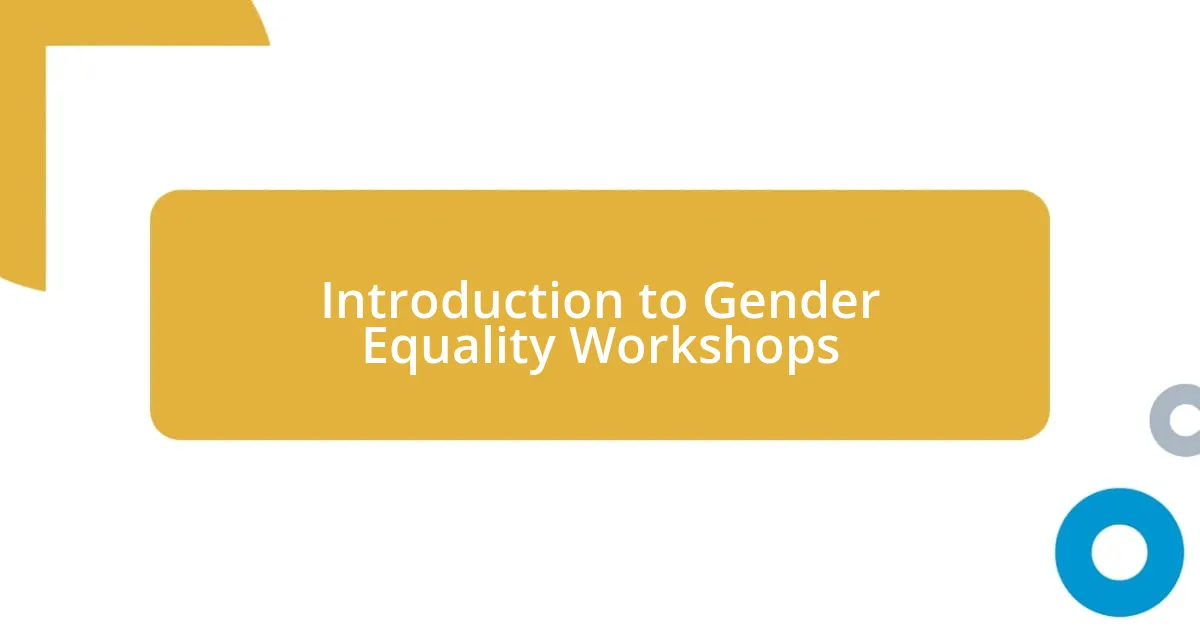
Introduction to Gender Equality Workshops
Gender equality workshops are dynamic spaces where individuals come together to explore the complexities of gender issues. I remember my first workshop vividly; the mix of excitement and apprehension I felt mirrored the nervous energy in the room. What if I said something wrong? Yet, what unfolded was a rich dialogue, where every voice, including mine, mattered.
These workshops serve as an essential learning platform, fostering an understanding of gender dynamics and encouraging personal reflection. I found that sharing our experiences—not just statistics or theories—made the discussions come alive. Have you ever realized how personal stories can transform a topic from abstract to relatable?
Through engaging activities and open conversations, participants often leave with a renewed sense of empowerment and awareness. I was challenged to confront my own biases, which was both uncomfortable and enlightening. Have you ever taken a moment to reflect on how your upbringing shaped your views on gender? That kind of introspection is invaluable, and that’s precisely what these workshops aim to inspire.
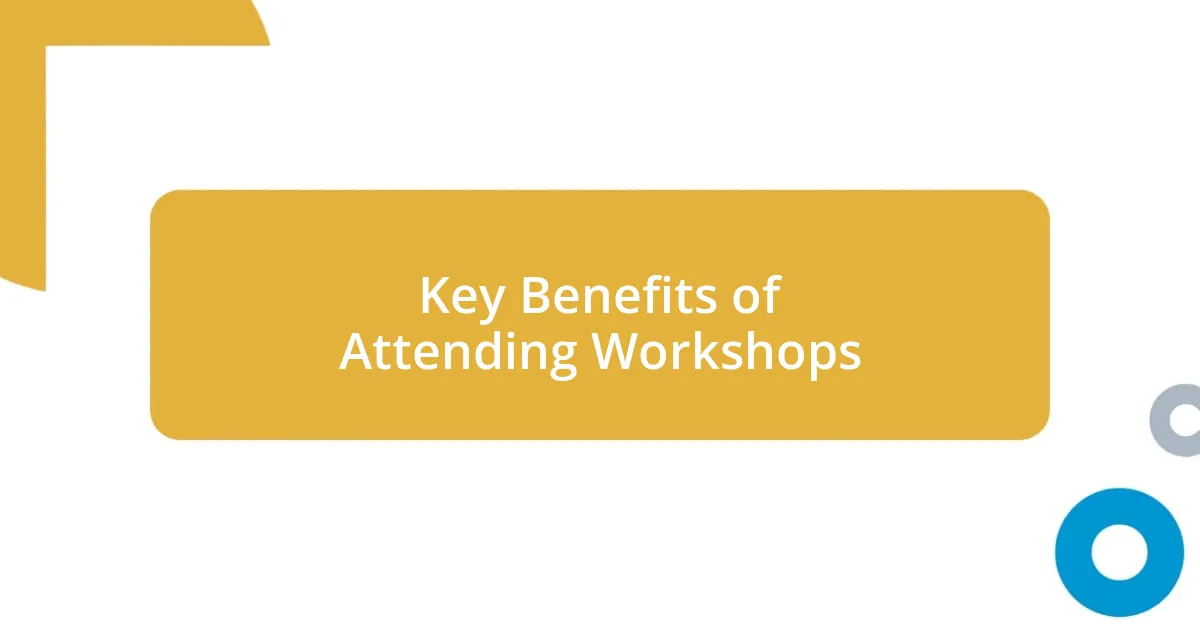
Key Benefits of Attending Workshops
Attending gender equality workshops offers profound advantages that extend beyond just gaining knowledge. For me, one of the key benefits was the sense of community fostered during these sessions. The connections I made with fellow participants were incredibly valuable. It’s like finding a tribe that shares similar concerns and goals. I remember having deep discussions that went late into the evening, where we encouraged each other to voice our fears and hopes regarding gender equality. Those moments not only expanded my understanding but also solidified lasting friendships.
Here are some key benefits of attending workshops:
- Increased Awareness: Workshops help participants recognize systemic gender issues that may have previously gone unnoticed.
- Personal Growth: They often challenge attendees to confront and reflect on their own biases and behaviors.
- Skill Development: Workshops equip individuals with practical tools to advocate for gender equality effectively.
- Networking Opportunities: Engaging with like-minded individuals can lead to collaborative projects and initiatives that continue beyond the workshop setting.
- Empowerment: The supportive environment encourages participants to share their stories, fostering a sense of agency and confidence.
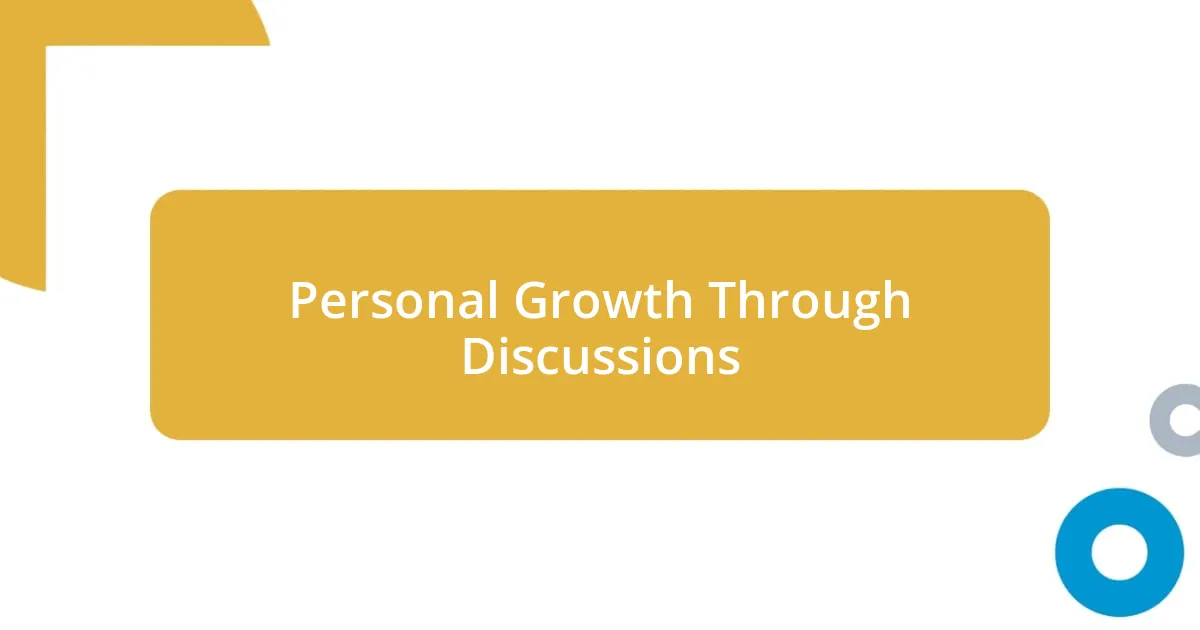
Personal Growth Through Discussions
Engaging in discussions during gender equality workshops has been a cornerstone of my personal growth. I distinctly remember a moment when I opened up about an experience that left me feeling powerless. The vulnerability I showed led to others sharing their own stories, and in that safe space, our collective understanding deepened. Have you ever felt that rush of empowerment from sharing something personal? I certainly did, and it reinforced the idea that we are not alone in our struggles.
The variety of perspectives I encountered also broadened my view significantly. I often found myself challenging my own preconceived notions, spurred on by others’ insights. It was like looking in a mirror that reflected both my beliefs and those of the people around me. It’s fascinating how a simple discussion can unravel layers of misunderstanding while weaving connections among diverse experiences. Have you ever noticed how conversations can shift your mindset in ways you never expected?
As I reflect on these experiences, I realize that the synergy of ideas shared during our discussions was more than just learning; it was transformative. I cherish the lightbulb moments when someone’s comment struck a chord within me, prompting a shift in my thinking. These interactions went beyond mere exchange; they were catalysts for growth and change. Have you ever found clarity just from hearing someone else’s viewpoint? I can say that these insightful discussions fostered not just knowledge but a personal metamorphosis.
| Aspect | Impact on Personal Growth |
|---|---|
| Sharing Experiences | Increased vulnerability and empathy among participants |
| Diverse Perspectives | Broader understanding and challenge of preconceived notions |
| Transformative Discussions | Catalysts for personal growth and change in mindset |
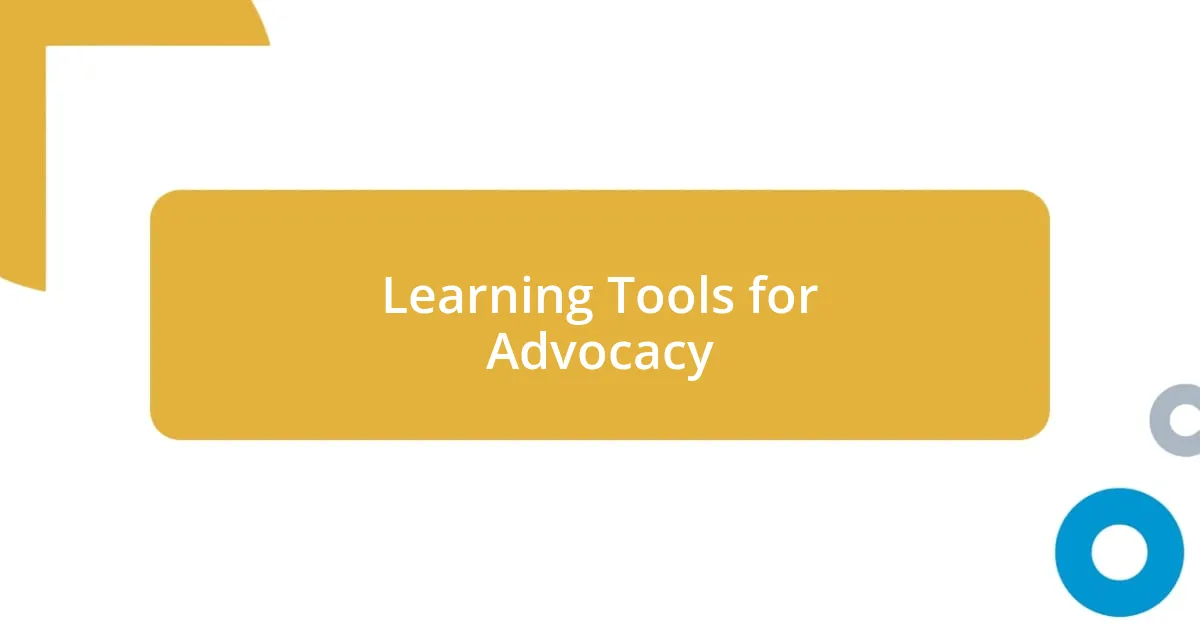
Learning Tools for Advocacy
Learning tools for advocacy emerged as indispensable assets during the workshops I attended. One particular exercise stood out: the role-play scenarios. Participating in these simulations allowed me to step into different shoes—literally and figuratively. I remember portraying a character facing workplace discrimination, and the emotional weight of that experience left a lasting impact. Have you ever tried to embody someone else’s struggles? It opened my eyes to the complexities of navigating gender biases and reignited my commitment to advocacy.
We also dived into creating effective messaging strategies. I recall crafting a short speech aimed at youth awareness on gender equality. Watching my peers react and offer feedback was enlightening. It made me realize how language can empower or disempower conversations. Isn’t it fascinating how the right words can resonate so deeply? I learned that advocacy isn’t just about what you say but how you say it.
Finally, we explored the importance of utilizing social media as an advocacy tool. I initially felt overwhelmed by the digital landscape, but a workshop on effective online campaigning transformed my perspective. I remember being inspired by a facilitator’s story of a successful hashtag campaign that drew global attention. It made me wonder: how can we leverage our voices on platforms we already engage with daily? This learning opened my mind to endless possibilities for creating change online, allowing me to feel more equipped to contribute to the movement.
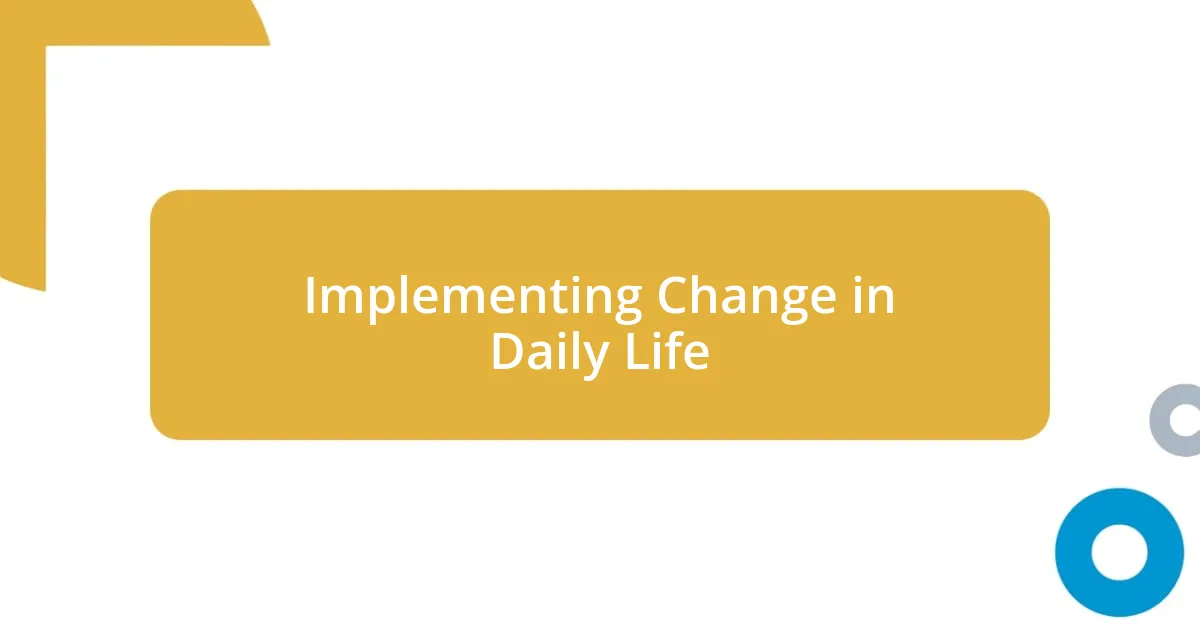
Implementing Change in Daily Life
Implementing change in daily life requires a conscious effort to infuse the principles of gender equality into our routines. I remember the first time I consciously addressed gendered language in conversation. It felt like a small step when I corrected a friend who casually used a term that diminished women’s contributions. Yet, it sparked a deeper dialogue that opened our eyes to the subtle biases we often overlook. Have you ever noticed how the words we choose can either uplift or undermine?
Another impactful change was incorporating gender sensitivity into my decision-making process. I recall a team meeting where the idea arose to highlight achievements in our project report. I suggested we ensure equal representation of all contributors, reminding everyone that recognition matters. It was rewarding when others echoed my sentiment, reinforcing that this awareness could influence our workplace culture. How often do we pause to consider who gets visibility and recognition?
I also started using social media platforms to share insights and articles related to gender equality. This was initially daunting; I wondered if my voice would even matter. But I soon learned that sharing personal reflections or highlighting community events could spark meaningful conversations. One post about a local initiative led to several friends reaching out to discuss how they could contribute. Isn’t it amazing how a simple action can inspire others to engage? Seeing this ripple effect motivated me to keep advocating, even in the small spaces of everyday life.
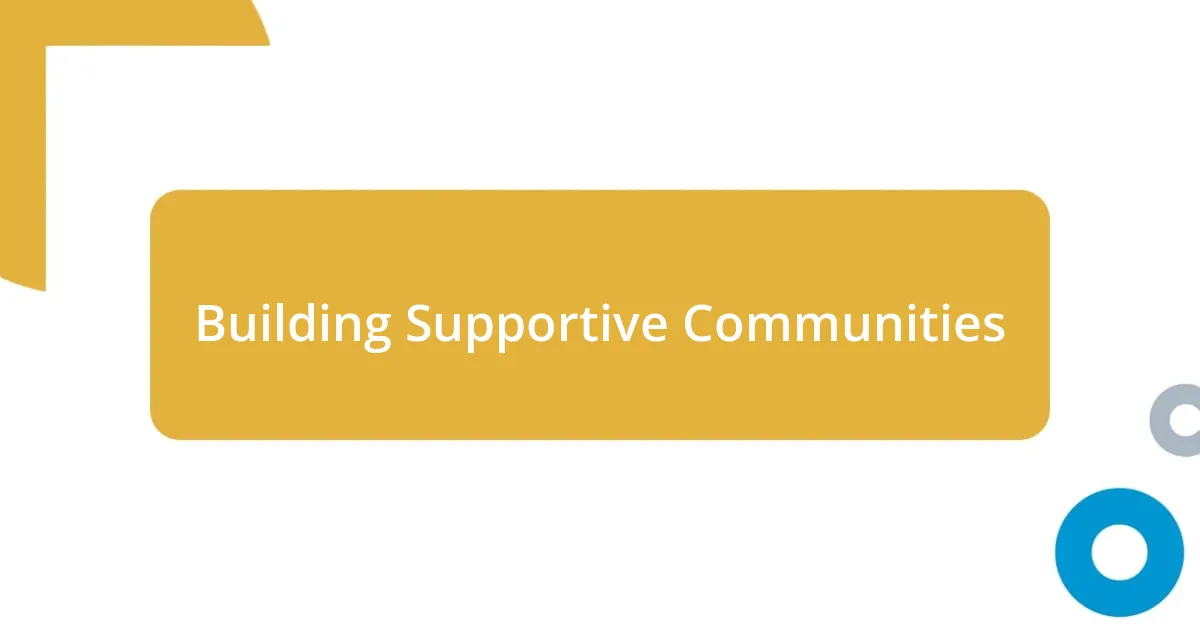
Building Supportive Communities
Building supportive communities is about fostering connections that empower individuals to advocate for gender equality. I recall joining a local group focused on creating safe spaces for discussion, and it was like a breath of fresh air. As I listened to diverse voices share personal experiences, I felt a sense of solidarity that reaffirmed our collective strength. Have you ever been in a group where you felt seen and heard? That sense of belonging can motivate us all to act.
One of the most eye-opening moments was when we organized a community event to raise awareness about gender issues. I remember standing behind the booth, ready to engage with attendees, and feeling a surge of excitement as conversations sparked around topics that mattered. What surprised me was the depth of curiosity and support within our neighborhood. We were not just discussing problems; we were brainstorming solutions together. Isn’t it incredible how collaboration can ignite change?
Creating supportive communities means holding each other accountable, too. During one workshop session, we emphasized the importance of following up with peers after discussions. I took this to heart and decided to check in with a friend I had met at the event who was grappling with similar frustrations. Our ongoing chats felt less like casual conversations and more like a commitment to uplift one another. How can we make it a norm to check in and empower our community? Building these supportive bonds enriches our journey toward gender equality and fosters a culture where everyone strives to do better.
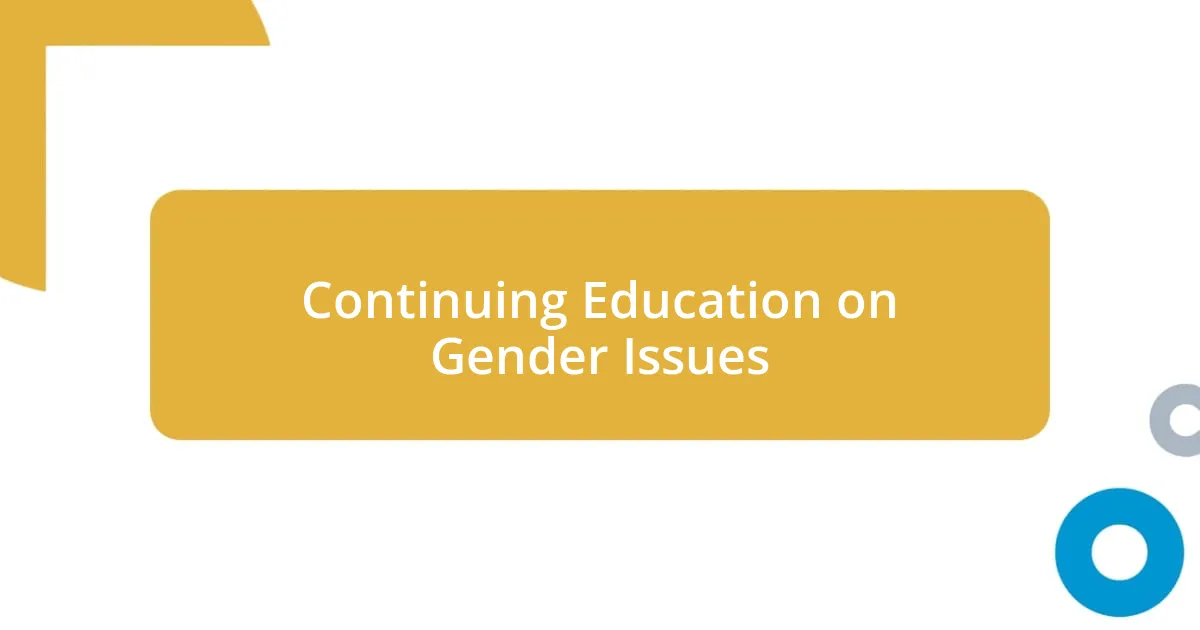
Continuing Education on Gender Issues
Continuing education on gender issues is essential for fostering ongoing growth and understanding. I recall participating in a workshop that introduced me to intersectionality — a term that describes how different social identities overlap and create unique experiences of discrimination. It clicked for me the moment the facilitator shared a story about a woman facing both racial and gender biases. Have you ever thought about how our various identities shape our perspectives? This session opened my eyes to the complexity of gender issues and why a one-size-fits-all approach doesn’t work.
Engaging in continuous learning ignites a deeper comprehension of the challenges faced by marginalized groups. For example, I recently enrolled in an online course that tackled gender-based violence. The real-life statistics and survivor testimonials were harrowing, but they inspired me to think critically about what I can do in my own community. Isn’t it striking how knowledge can profoundly impact our actions and attitudes? After absorbing those powerful lessons, I felt motivated to facilitate discussions in my circles, hoping to raise awareness and spark action.
Moreover, integrating gender issues into professional development can yield transformative results. I remember attending a corporate seminar where we explored gender biases in hiring practices. It was alarming yet enlightening to see how unconscious stereotypes can creep in during recruitment. Reflecting on my previous experiences, I realized how often I’d seen resumes overlooked for superficial reasons. How many talented individuals have gone unnoticed because of such biases? This newfound awareness spurred me to advocate for more equitable hiring processes within my organization, turning insight into tangible change.






